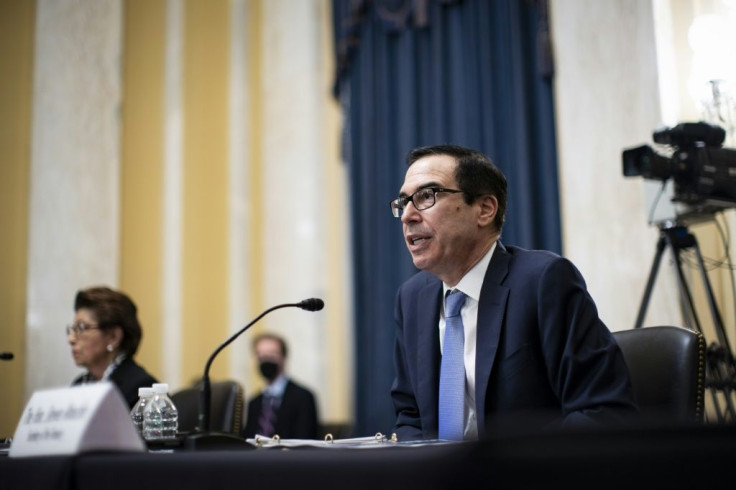What Will The Next Round Of Coronovirus Economic Relief Look Like? Talks Get Underway

KEY POINTS
- House Democrats adopted a $3.5 trillion relief package more than a month ago but Senate Republicans rejected it
- Republicans and the White House are eying $1 trillion in relief
- Lawmakers have three weeks to come up with a measure before breaking for Labor Day
Republicans on Monday began mulling the next wave of coronavirus relief amid an administration push to get the economy back to normal, surging case counts and debate over whether children should return to schools.
Senate Majority Leader Mitch McConnell, House Minority Leader Kevin McCarthy and other GOP lawmakers were to meet at the White House with Treasury Secretary Steven Mnuchin to begin crafting a response to the $3.5 trillion bill adopted by the House more than a month ago.
Reports during the weekend indicated the administration wants to strip $25 billion in new funding proposed to help states with coronavirus testing and contact tracing, and billions more for the Centers for Disease Control and Prevention. What Trump does want in the package is a payroll tax holiday, something he has proposed periodically for months after first rejecting the idea. He said in an interview on “Fox News Sunday” he would consider rejecting any relief package that doesn’t contain one.
The talks come as the CDC reported 67,574 new cases of coronavirus Monday compared to the previous 24 hours along with 877 deaths, bringing the total death count to nearly 140,000 since the pandemic took hold in the United States. The daily case count has risen steadily for weeks as states lifted restrictions adopted to keep the virus in check.
Pressure has been growing on Congress to take action as local officials began retightening restrictions. The Washington Post reported Monday Republicans plan to tie $70 billion federal funds to elementary and secondary schools to whether they reopen, along with a payroll tax cut, which would do nothing for those on unemployment rolls.
The 7.65% payroll tax paid by both employers and employees funds Social Security and Medicare,
The July 31 deadline is looming for the $600 a week bonus in unemployment benefits being paid to people laid off because of the pandemic. In practical terms, the benefit will be paid only through July 25, meaning the economy is about to take another hit as some 25 million Americans lose $15 billion in spending power a week, unemployment expert Andrew Stettner of the Century Foundation told International Business Times in an email. Republicans have expressed fears the $600 a week bonus encourages some workers to remain unemployed. The bill also is expected to eliminate funds for cities and states, which are struggling to cover the costs of the pandemic, the Post said.
“Unfortunately, by all accounts the Senate Republicans are drafting legislation that comes up short in a number of vital areas, such as extending unemployment benefits or funding for rental assistance, hazard premium pay for frontline workers, or investments in communities of color being ravaged by the virus, and many other necessary provisions,” Senate Minority Leader Chuck Schumer said in a letter to the Democratic caucus Monday.
He added: “From what we understand from press reports, Leader McConnell’s bill will prioritize corporate special interests over workers and main street businesses, and will fail to adequately address the worsening spread of the coronavirus.”
Mnuchin said Friday the administration wants more money for the paycheck protection program, which still has $100 billion in unused funds of the more than $600 billion appropriated earlier to two tranches. The program has been riddled by fraud, the Post reported, with the administration unsure exactly how many jobs at small businesses were saved.
Congress has been out of town for the Fourth of July holiday and traditionally breaks for the campaign season before Labor Day. Lawmakers essentially have three weeks to take action.
McConnell declined to take any action on coronavirus relief before leaving down, saying he wanted to see how the first $3 trillion in aid adopted by lawmakers had affected the economy. After House Democrats adopted their proposal, McConnell said the Senate wouldn’t even consider it.
Since then, Trump has floated $1 trillion as the target for the next round of relief, with the budget deficit already approaching $1 trillion a month.
Though the unemployment rate dropped from 14.7% in April to 11.1% in May, more than 1 million people still are filing initial unemployment claims every week, now 17 weeks in a row.
© Copyright IBTimes 2025. All rights reserved.






















